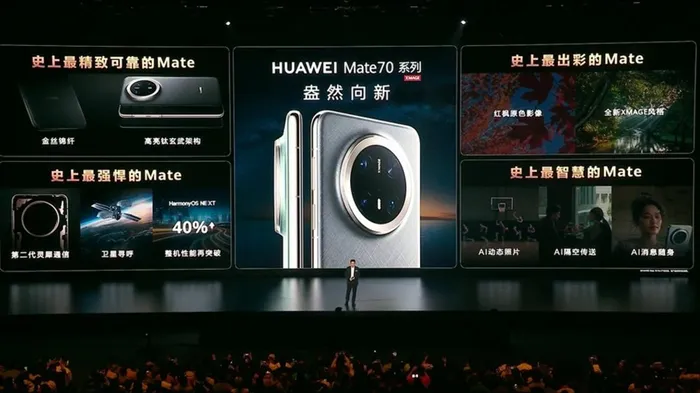Huawei’s new Mate 70 series unveiled among their first smartphones that don’t run Android

Chinese smartphone giant, Huawei, launched the new Mate 70 series with home-grown operating system. Picture: X/IFENG_official
Huawei has unveiled its new Mate 70 series and it is the first of their smartphones which will run on their operating system, HarmonyOS Next.
The phones were revealed at an event held at Shenzhen, China, on Tuesday.
This move by the telecom giants comes as Huawei continues to face stringent US sanctions that have barred it from accessing Google Mobile Services (GMS), including the Android ecosystem, since 2019.
The Mate 70 is the successor of the Mate 60, which was released last year and made waves because it contained a semiconductor that many had thought Huawei Technologies would not be able to produce, given the US restrictions meant to curb its high-end smartphone production.
Chairman of Huawei’s consumer business group, Richard Yu, called it “the most powerful Mate phone ever,” at the launch event that was streamed online.
HarmonyOS Next, touted as "pure HarmonyOS," is built without reliance on Android frameworks, marking a significant step by the company in creating a distinct mobile ecosystem to compete with tech giants Apple’s iOS and Google’s Android.
According to Huawei, the new operating system currently supports over 15,000 native apps, catering primarily to Chinese users, with plans to expand to 100,000 apps in the coming months.
This Android-free operating system also comes as the US is expected to announce new export controls that could blacklist up to 200 Chinese chip companies from trading, as soon as this week, according to Reuters.
The US sanctions, part of the broader trade war with China, have profoundly impacted Huawei's global smartphone market share over the years.
However, data from research firm, Counterpoint, reveals that the company has managed to leverage these restrictions to strengthen its position in the Chinese market, where it has surpassed Apple in mobile operating system usage with a 18% share in Q3, 2024.
Huawei's bold move to HarmonyOS Next also reflects a broader effort by China to reduce dependency on US technologies and foster domestic innovation.
The Mate 70 prices will start at 5,499 yuan (R13,700), said Yu, which is slightly below the cost of Apple’s base iPhone 16 model in China. Local pricing is not available yet.